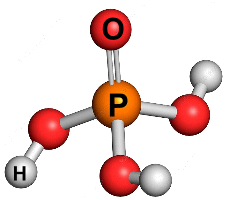  Phosphoric acid H3PO4 is a colourless, odourless, inorganic compound that contains phosphorus. It's a corrosive acid that's used in many industrial and household applications. Pure phosphoric acid is most often seen as a solid or a dense liquid. It's not a strong acid; however, it is corrosive and can cause permanent scarring. It is an irritant or corrosive to the skin and eyes.
Phosphoric acid H3PO4 is a colourless, odourless, inorganic compound that contains phosphorus. It's a corrosive acid that's used in many industrial and household applications. Pure phosphoric acid is most often seen as a solid or a dense liquid. It's not a strong acid; however, it is corrosive and can cause permanent scarring. It is an irritant or corrosive to the skin and eyes.
 Phosphoric acid is used as a fertilizer, and as a rust remover. However, it is most well known as a food additive, being added to some cola drinks and flavoured waters. Phosphoric acid is deliberately added to soft drinks to give them a sharper flavour. It also slows the growth of molds and bacteria, which would otherwise multiply rapidly in the sugary solutions. Almost all of the acidity of soda pop comes from the phosphoric acid and not from the carbonic acid from the dissolved CO2.
Phosphoric acid is used as a fertilizer, and as a rust remover. However, it is most well known as a food additive, being added to some cola drinks and flavoured waters. Phosphoric acid is deliberately added to soft drinks to give them a sharper flavour. It also slows the growth of molds and bacteria, which would otherwise multiply rapidly in the sugary solutions. Almost all of the acidity of soda pop comes from the phosphoric acid and not from the carbonic acid from the dissolved CO2.
This use is particularly controversial with regard to the potential for harmful effects. Phosphoric acid in soft drinks can cause dental erosion. Phosphoric acid can also contribute to the formation of kidney stones, especially in those who have had kidney stones previously. Interestingly, a link has been shown between long-term regular cola intake and osteoporosis in later middle age in women (but not men). Reference: The American Journal of Clinical Nutrition |